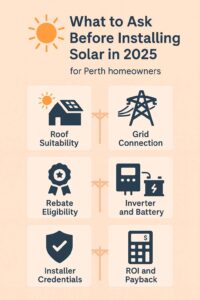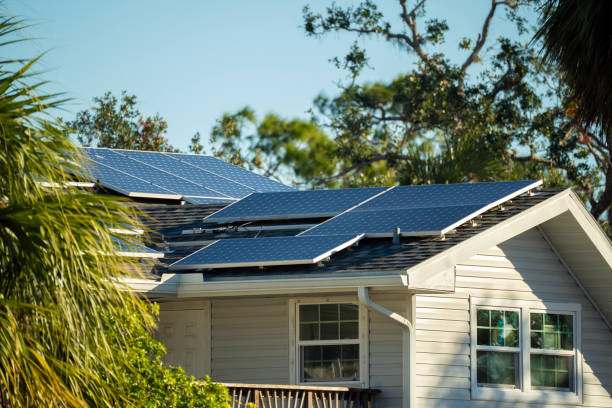As solar technology continues to advance and energy costs rise, more Perth homeowners are turning to solar energy as a long-term investment in sustainability and savings. However, a successful installation hinges on asking the right questions before committing. This 2025 checklist outlines what every homeowner should consider prior to installing a solar power system—covering grid connection, roof suitability, rebates, and installer credentials.
1. Is Your Roof Orientation and Condition Suitable for Solar?
Before installing any system, determine whether your roof has sufficient sunlight exposure and structural integrity. In Perth, north-facing roofs typically provide the best solar yield. Key questions to ask include:
- Is my roof north-facing or angled to maximise solar exposure?
- Are there obstructions (trees, other buildings) casting shade?
- Is my roof in good condition, or will it require repairs before installation?
2. How Will the System Connect to the Grid?
Grid connection is critical, particularly for homes that want to export surplus power. Perth homeowners should:
- Confirm their eligibility for grid connection under Western Power’s technical requirements.
- Understand what happens during a blackout—does the system include blackout protection or hybrid capabilities?
- Ask about smart meter compatibility for energy export tracking.
If you are considering future expansion, ensure the system can scale easily. This is especially important for households planning to add a solar battery installation in Perth for energy independence.
3. Are You Eligible for Government Rebates or Incentives?
Rebate eligibility can substantially reduce upfront costs. In 2025, homeowners may access:
- Federal STCs (Small-scale Technology Certificates).
- WA-specific rebates or subsidies (if applicable).
- Interest-free green loans or solar incentives from select councils.
Ask:
- Is my property eligible for STCs?
- Will the installer handle rebate applications?
- Are there any time-sensitive incentive schemes I should act on now?
4. What Kind of Inverter and Battery System Is Being Proposed?
The inverter is the brain of your solar setup, converting DC from panels to AC for home use. Verify:
- The efficiency rating and warranty of the inverter.
- Whether the inverter is hybrid-compatible for battery integration.
If you’re looking at solar inverter installation in Perth, ensure the model is Clean Energy Council (CEC)-approved and matched correctly with your panel array.
5. Is the Installer Accredited, Insured, and Transparent?
A poor installation can reduce efficiency, void warranties, and create safety issues. Vet your installer by asking:
- Are you CEC-accredited?
- Do you have public liability and warranty insurance?
- Can you provide references from recent Perth installations?
Also, clarify whether the company subcontracts any part of the work and who will be responsible for after-sales service and maintenance.
6. What Warranties and Maintenance Plans Are Included?
Solar components typically come with different warranties:
- Panel performance (often 25 years).
- Product warranty (10–15 years).
- Inverter warranty (typically 5–10 years).
Ask whether the installer offers:
- Scheduled maintenance or inspections.
- Fault detection and remote monitoring.

7. What Are the Projected ROI and Payback Period?
A reputable installer should provide you with a clear projection of:
- System size versus household usage.
- Annual energy savings in dollar terms.
- Estimated payback period and long-term ROI.
This financial clarity is essential to determine whether the system justifies the investment.
8. How Will the Installation Be Managed from Start to Finish?
Project coordination can impact timeframes and outcome. Ask:
- What is the timeline from contract to activation?
- Are council approvals or Western Power applications included in the service?
- Who will be your point of contact during the process?
Conclusion
Investing in solar energy in 2025 requires more than just comparing prices. It demands a clear understanding of your property, your energy goals, and the credentials of the installation provider. From system configuration and solar battery installation in Perth to rebate eligibility and warranty protection, each detail contributes to long-term system performance and savings.
Always choose an installer that offers transparency, accreditation, and proven expertise in the Perth solar market. Asking these key questions upfront ensures your investment delivers on both environmental and financial goals.

